
Herbert Jeffrey Hancock is an American jazz musician, bandleader, and composer. Hancock started his career with trumpeter Donald Byrd's group. He shortly thereafter joined the Miles Davis Quintet, where he helped to redefine the role of a jazz rhythm section and was one of the primary architects of the post-bop sound. In the 1970s, Hancock experimented with jazz fusion, funk, and electro styles, using a wide array of synthesizers and electronics. It was during this period that he released perhaps his best-known and most influential album, Head Hunters.
Modal jazz is jazz that makes use of musical modes, often modulating among them to accompany the chords instead of relying on one tonal center used across the piece.

Frederick Dewayne Hubbard was an American jazz trumpeter. He played bebop, hard bop, and post-bop styles from the early 1960s onwards. His unmistakable and influential tone contributed to new perspectives for modern jazz and bebop.
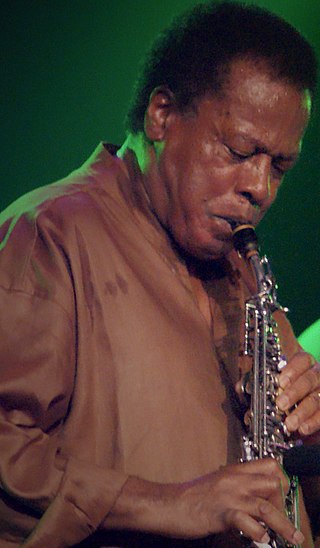
Wayne Shorter was an American jazz saxophonist, composer and bandleader. Shorter came to mainstream prominence in 1959 upon joining Art Blakey's Jazz Messengers, for whom he eventually became the primary composer. In 1964 he joined Miles Davis' Second Great Quintet, and then co-founded the jazz fusion band Weather Report in 1970. He recorded more than 20 albums as a bandleader.
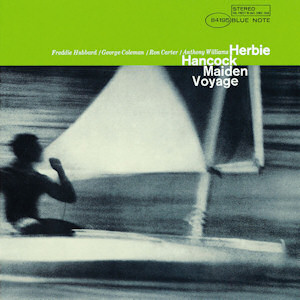
Maiden Voyage is the fifth album led by jazz musician Herbie Hancock, and was recorded by Rudy Van Gelder on March 17, 1965, for Blue Note Records. It was issued as BLP 4195 and BST 84195. Featuring Hancock with tenor saxophonist George Coleman, trumpeter Freddie Hubbard, bassist Ron Carter and drummer Tony Williams, it is a concept album aimed at creating an oceanic atmosphere. As such, many of the track titles refer to marine biology or the sea, and the musicians develop the concept through their use of space. The album was presented with the Grammy Hall of Fame Award in 1999.
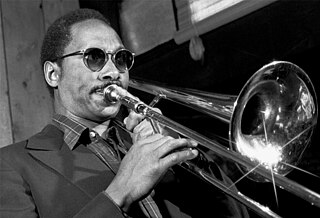
Julian Priester is an American jazz trombonist and occasional euphoniumist. He is sometimes credited "Julian Priester Pepo Mtoto". He has played with Sun Ra, Max Roach, Duke Ellington, John Coltrane, and Herbie Hancock.

George Edward Coleman is an American jazz saxophonist known for his work with Miles Davis and Herbie Hancock in the 1960s. In 2015, he was named an NEA Jazz Master.

Gerald Stenhouse Jemmott is an American bass guitarist. Jemmott was one of the chief session bassists of the late 1960s and early 1970s, working with many of the period's well-known soul, blues, and jazz artists. He has won two Grammy Awards.

"Watermelon Man" is a jazz standard written by Herbie Hancock for his debut album, Takin' Off (1962).

Speak Like a Child, the sixth album by American jazz pianist Herbie Hancock, which was recorded and released by Blue Note Records in 1968, features Hancock's arrangements for an unusual front line of Jerry Dodgion on alto flute, Peter Phillips on bass trombone, and Thad Jones on flugelhorn. Critic Nat Hentoff described the album as an "impressive further stage in the evolution of Herbie Hancock as writer and player," saying it is characterized by a "singular quality of incisive, searching lyricism." Unusually, none of the wind players perform solos on any song. The rhythm section is bassist Ron Carter and drummer Mickey Roker.
"Don't Explain" is a song written by jazz singer Billie Holiday and Arthur Herzog Jr. It was Billie Holiday’s final song.

The discography of the American jazz artist Herbie Hancock consists of forty-one studio albums, twelve live albums, sixty-two compilation albums, five soundtrack albums, thirty-eight physical singles, nine promo singles and four songs not released as singles, but that charted due to downloads. This article does not include re-issues, unless they are counted separately from the original works in the charts, furthermore because of the enormous amount of material published, this discography omits less notable appearances in compilations and live albums. The discography shows the peak weekly main chart positions of eight selected countries: United States, France,[a] Germany, Japan,[b] Netherlands, Sweden,[c] Switzerland and United Kingdom. Positions also listed on United States are R&B / hip hop, dance / club, jazz[d] and bubbling under charts.[e] The peaks do not refer necessarily to the position that a record reached when it was first released. Also included are certifications from the Recording Industry Association of America (RIAA)[f] and the Bundesverband Musikindustrie (BVMI).[g]

First Light is an album by jazz trumpeter Freddie Hubbard. Recorded in 1971, it features string arrangements by Don Sebesky. It was his third album released on Creed Taylor's CTI label and features performances by Hubbard, Herbie Hancock, Eric Gale, George Benson, Ron Carter, Jack DeJohnette, Airto Moreira and Richard Wyands. The album is part of a loose trilogy including his two previous records at the time, Red Clay and Straight Life. First Light won a 1972 Grammy Award for "Best Jazz Performance by a Group".

Blow-Up is a soundtrack album by American jazz pianist Herbie Hancock, featuring music composed for Michelangelo Antonioni's 1966 film Blowup. MGM Records released the album in the United States on 20 February 1967, and in the United Kingdom on 10 May. The album features performances by Hancock, trumpeters Freddie Hubbard and Joe Newman, alto saxophonist Phil Woods, tenor saxophonist Joe Henderson, guitarist Jim Hall, bassist Ron Carter and drummer Jack DeJohnette. Although Jimmy Smith is credited with playing organ on the album, some sources claim it was actually Paul Griffin who was at the sessions.
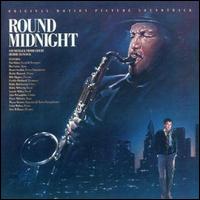
Round Midnight is a soundtrack album by Herbie Hancock featuring music recorded for Bertrand Tavernier's film Round Midnight released in 1986 on Columbia Records. The album features performances by Hancock, trumpeter Freddie Hubbard, bassist Ron Carter, drummer Tony Williams, vocalist Bobby McFerrin, tenor saxophonist Dexter Gordon, bassist Pierre Michelot, drummer Billy Higgins, guitarist John McLaughlin, trumpeter/vocalist Chet Baker, vibraphonist Bobby Hutcherson, saxophonist Wayne Shorter, vocalist Lonette McKee, and pianist Cedar Walton, most of whom appear in the film. It won the Academy Award for Best Music, Original Score in 1986, beating Ennio Morricone's The Mission and Jerry Goldsmith's Hoosiers, among others. Additional music recorded during the making of the film was released under Dexter Gordon's name as The Other Side of Round Midnight (1986).

"My Ship" is a popular song written for the 1941 Broadway musical Lady in the Dark, with music by Kurt Weill and lyrics by Ira Gershwin.
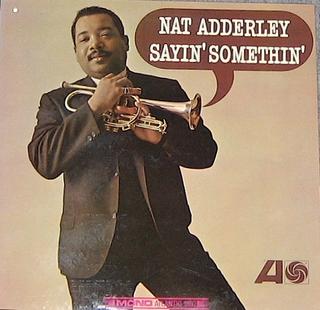
Sayin' Somethin' is an album by jazz cornetist Nat Adderley released on the Atlantic label featuring four performances by Adderley with an 11-piece orchestra and four by Adderley's Quintet with Joe Henderson, Herbie Hancock, Bob Cranshaw, and Roy McCurdy.

"Maiden Voyage" is a jazz composition by Herbie Hancock from his 1965 album Maiden Voyage. It features Hancock's quartet – trumpeter Freddie Hubbard, bassist Ron Carter and drummer Tony Williams – together with saxophonist George Coleman. It is one of Hancock's best-known compositions and has become a jazz standard.
In the late 1960s, Latin jazz, combining rhythms from African and Latin American countries, often played on instruments such as conga, timbale, güiro, and claves, with jazz and classical harmonies played on typical jazz instruments broke through. There are two main varieties: Afro-Cuban jazz was played in the US right after the bebop period, while Brazilian jazz became more popular in the 1960s. Afro-Cuban jazz began as a movement in the mid-1950s as bebop musicians such as Dizzy Gillespie and Billy Taylor started Afro-Cuban bands influenced by such Cuban and Puerto Rican musicians as Xavier Cugat, Tito Puente, and Arturo Sandoval. Brazilian jazz such as bossa nova is derived from samba, with influences from jazz and other 20th-century classical and popular music styles. Bossa is generally moderately paced, with melodies sung in Portuguese or English. The style was pioneered by Brazilians João Gilberto and Antônio Carlos Jobim. The related term jazz-samba describes an adaptation of bossa nova compositions to the jazz idiom by American performers such as Stan Getz and Charlie Byrd.

Directions is a compilation album by American jazz musician Miles Davis, released in 1981 by Columbia Records. It collects previously unreleased outtakes that Davis recorded between 1960 and 1970. Directions was the last of a series of compilation albums—mostly consisting of, at that time, previously unreleased music—that Columbia released to bridge Davis' recording hiatus that ended with the Man with the Horn in July 1981.
















